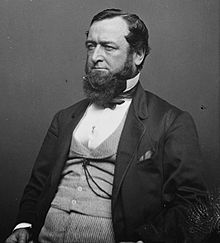Charles R. Train
| Charles Russell Train | |
|---|---|
 |
|
| Member of the U.S. House of Representatives from Massachusetts's 8th district |
|
|
In office March 4, 1859 – March 3, 1863 |
|
| Preceded by | Chauncey L. Knapp |
| Succeeded by | John D. Baldwin |
| 16th Massachusetts Attorney General | |
|
In office 1872–1879 |
|
| Preceded by | Charles Allen |
| Succeeded by | George Marston |
| Member of the Massachusetts House of Representatives | |
|
In office 1848–1849 |
|
| Personal details | |
| Born | October 18, 1817 Framingham, Massachusetts |
| Died | July 28, 1885 (aged 67) Conway, New Hampshire |
| Resting place | Edgell Grove Cemetery, Framingham, Massachusetts |
| Political party | Republican |
| Children | Charles Jackson Train |
| Alma mater | Brown University |
| Profession | Law |
Charles Russell Train (October 18, 1817 – July 28, 1885) was a U.S. Representative from Massachusetts.
Born in Framingham, Massachusetts, Train attended the common schools, Framingham Academy, and was graduated from Brown University, Providence, Rhode Island, in 1837. He studied law at Harvard University. He was admitted to the bar and commenced practice in Framingham, Massachusetts, in 1841. He served as member of the Massachusetts House of Representatives in 1847 and 1848. He served as district attorney 1848-1854. He declined the appointment of Associate Justice of the Supreme Court of the United States in 1852. He served as delegate to the Massachusetts Constitutional Convention of 1853. He served as delegate to the Republican National Convention in 1856 and 1864. He served as member of the Massachusetts Governor's Council in 1857 and 1858.
Train was elected as Republican to the Thirty-sixth and Thirty-seventh Congresses (March 4, 1859 – March 3, 1863). He served as chairman of the Committee on Public Buildings and Grounds (Thirty-sixth and Thirty-seventh Congresses). He was not a candidate for renomination in 1862. He was one of the managers appointed by the House of Representatives in 1862 to conduct the impeachment proceedings against West H. Humphreys, United States judge for the several districts of Tennessee. During the Civil War served in the Union Army as a volunteer aide-de-camp to General George B. McClellan. He moved to Boston, Massachusetts. He again served in the Massachusetts House of Representatives 1868-1871. Massachusetts Attorney General 1872-1879. He resumed the practice of law. He died while on a visit in Conway, New Hampshire, July 28, 1885. He was interred in Edgell Grove Cemetery, Framingham, Massachusetts.
...
Wikipedia
